Tani Coyote
Son of Huehuecoyotl
- Joined
- May 28, 2007
- Messages
- 15,195
Before we start, a few comments:
1) Sorry for basically ditching my story about the Roman Empire...guess it's dead. Hopefully this one will do better...
2) I modded this map:
a - Deserts, Mountains and Tundra cannot be used for cities. This is to try and reduce the strain of the city limit, as well as create 'natural' barriers, much like the Sahara and Himalayas did in true history.
b - Some civs have favored positions. For instance, Rome, Persia, Egypt, Carthage, China and Greece all start with a moderate level of infrastructure. The silk road of old also runs through the map, making it a profitable route in early times.
c - Some civs are entirely new and sport their own brand of units, and some units have been empowered. For instance, the Greek Hoplite will OWN anything that tries to fight it, Roman Legionaries are equally skilled in defense and offense, and the Persian Immortal will crush most defenders with ease. Greece starts off with a Hoplite unit to serve as a buffer state between Rome and Persia. The Arab Ansars can now become insanely powerful, while the Turks and Mongols share a nomadic horseman that can be a thorn in 'civilised' countries' sides.
Civilisations like Polynesia were quickly put together. They can cross the oceans and seas at an early year with their sink-proof ships. They start in Hawaii, and could develop into a vast overseas empire.
d - Depending on their historical significance, countries were given more settlers. The Persians, Romans, British and Russians, because of their very successful and long-lived empires, start with 3 settlers, 3 spearmen and 3 workers. Same goes for China.
e - On a minor note, in story terms: Every unit of health constitutes 100 men unless otherwise noted, and 1 unit of gold is worth 100,000 in story terms.
Now, enjoy the beginning of the Persian dominance!
Tanician Persia - 3000 BC - 2500 BC
------------------
An excerpt from the Chronicles of Persia by an author whose name has been forsaken in time...
"...The Persian Empire was not always so vast. Not covering every corner of the center of the world and the four directions beyond it. How we began is very simple.
The many faiths and townships that made up what is now the region of Persepolis were independant. They were fierce rivals with eachother, and many battles would occur intermittenly, decimating the region. That is at least until the great one, Cyrus II, was born. Upon reaching a sufficient age, he used statesmenship and war to unite the cities, centralise the government and then before the end of his rule conquered the many minor tribes, carving out a political entity which stretched across much of the Fertile Crescent...our role as a power was secured.
We were blessed not really by Cyrus, but by his true parents..not the mortal husks who fathered him, but the great deities of Heaven themselves..."
To this day, though the religion of Persia has indeed changed much, we still believe Cyrus had divinity. He had incredible longevity, incredible ability, and was able to bring peace to a warlike region for some time. He lived nearly 70 years, and in that timespan laid the foundations of our great empire...
If we go by scientific chronicles, the story is mostly the same, minus the 'gods.'
It all began about 6 millenia ago...in the stretch of desert and plains now called Persepolis.
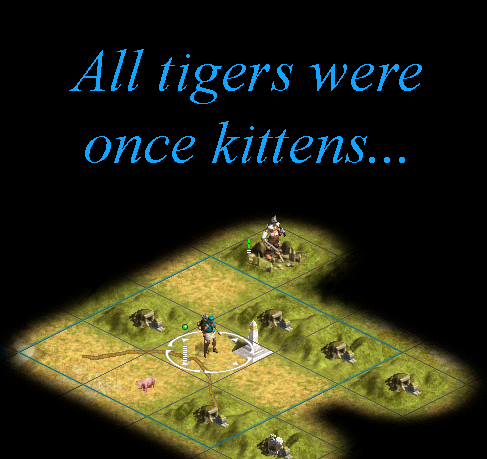
We were surrounded by enemies from the start. A race called the Aryans inhabited the mountains and hills to the north. We tried our best not to aggravate them, but they nonethless would occassionally come in, killing men, dragging off women and crops...burning down homes. Causing havoc.
Cyrus changed all that!
Under the Great Leader Cyrus, we expanded our hold. By 2950 BC, near the end of his reign, we had expanded our borders, establishing colonies in Mesopotamia. This city was named Baghdad, un-Persian, but it was to keep the local tribes happy. Far flung as our possessions were, we nonetheless were far more secure from external threats.
Cyrus also set out to learn more about the vast world around us, dispelling the mystic theories that we were the only ones out there. Scouts were sent to the northwest, into what is called Asia Minor by the Greco-Romans.
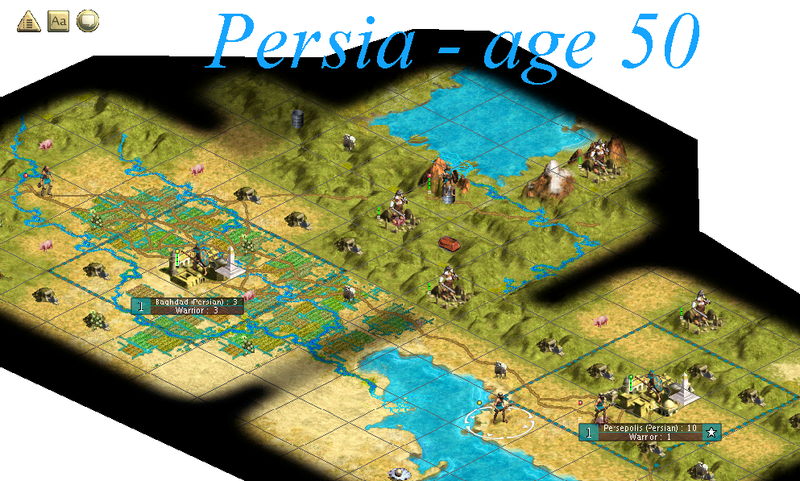
It is said that Cyrus died in a very strange way. As he lie ill on his deathbed, he was heard rambling on. He woke up, and in what we believe was a seizure, started to spew these words: "A primitive people...a primitive land! The Mayans and Aztecs, gone!" Cyrus died afterwards...what caused this, we do not know. We believe it was prophecy, for we know now that there were an ancient people in the New World by those names...how Cyrus knew their names and the fact they mysteriously disappeared...we do not know. At the time, some radical philosophers assumed this meant there were great civilisations to match ours.
At first we laughed, but our scouts discovered something interested in northwest Asia Minor. Blocking the path was a row of men in green, carrying golden shields and with spears held out. Our scout was threatened, said an inch further would constitute war against 'Greece'. Apparently there WERE other peoples!
A little later, our new leader, Cyrus III, young as he was yet nonetheless intelligent, went back to the same location with his personal guard. After sitting down with the Greek Leader, Byzanteas, the tyrannical despot of Byzantium, we worked out agreements. We gave up 9,000,000 of our 10 million units of gold...for a very lucrative technology known as the alphabet, a way of writing down messages..we also had to give them pottery, which an impoverished village had taught Cyrus to make before he slaughtered them all.
That's right, slaughtered. Cyrus III was a b--tard, unlike his father. He was different from Cyrus...very nationalist and fascist. He was arrogant and cocky. 'Tis was the price of being rushed to the throne so quickly without study...
So Cyrus returned to Persia without much money...and was promptly slain by the mob when they got word of how he got the knowledge of Pottery. The reason? Not outrage, but law itself. Cyrus had lied, he had told the people the Greeks had ackowledged Persian dominance, giving him both technologies and demanding a minor fee. Taking a loss to show their submission.
Lying was forbidden in Persia, even on the leader's part. Not being anywhere near as righteous as his father, Cyrus III was executed. His guards stood aside, knowing it to be the truth that this man could not compare to his father.
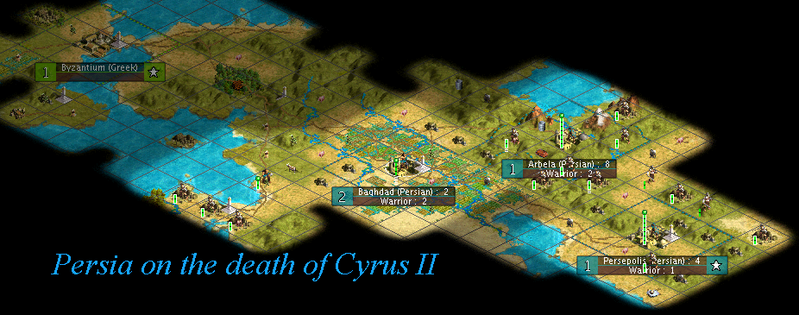
Thank whatever deity you all worship Cyrus was removed within a year! Who knows what horrors he would have committed.
Cyrus III nonetheless played a vital role. He expanded our view of the world. Another village inhabited by 'Bactrians' was found. The chief had been kidnapped and the natives were told to reveal what they knew or he would die. When they did, they were all slain anyways. This map proved useful...the areas southwest of Byzantium, the 'Greece' spoken of...was revealed.
While we were being harassed by Aryans, our forces explored and found more of the region known as the Levant. We found a land bridge connected it to what is now Africa...but it was blocked all across by a horde known as the Hyksos. They were settled there and would not let us pass...unless we were willing to get impaled as we walked.
The Aryan Wars 2945 BC - 2530 BC
The Aryans were a vicious people. Knowing we were growing in power and would soon displace them, they launched an assault. At first their attacks were minor...then they focused on destroying what kept us together - Our roads. Roads around Persepolis and the new city of Arbela found themselves destroyed. The central city of Baghdad, settled in the center of our empire, in the perfect farmlands and between the two rivers, looked appealing as a capital...at this time, however, it was too dangerous to try a move in our seat of government.
Nonetheless, many of the common laborers were evacuated. Wartime production was put into place. Our unskilled people were being trained...they could not compare to the Royal Guard in qualities, but we needed to give it our all to drive out the savages.
We started to garner victories. The Greeks, seeing the chaos, fortified one of their men at the strategic point where Asia Minor and Asia connected, in the northeast corner of the Mediterranean...what is called Antioch now. They did not want any escaping hordes to flood into their lands...superior as their hoplites were.
We destroyed most of the Aryan tribes around the heartland by 2530. We had dispersed their bases and added their gold to our funds...sending it to the newly constructed city of Suez in the west to aid their construction project.
Nonetheless, the war on the Aryans claimed thousands of lives. Many of these were common peasants, thrust into battle to protect their country and it's existance.
The War on Barbarism
But we were fools. The Hyksos did not take kindly to us building the city and disbanding their encampments around it. They responded by attacking the city and slaying most of it's garrison and inhabitants. Most of our spoils were dragged off...but it mattered little to us. We still controlled one of the largest empires, and no savagaes would stop us!
Angered by this grave offense, the King made a declaration. Persians, when able and when capable, were to slaughter all barbarians they came across. He added 3 major tribes to this list: The Aryans in Persia, the Hyksos in Africa, and the Uzbeks in Asia to a limited extent. They must not be allowed to disrupt our growth!
Nonetheless, we worked on rebuilding Suez's economy. We sent more soldiers to the city, and were preparing to confront the Egyptians to the south...
But before that occurred, we completed our chariots. Few as they were, they were fast enough they could be useful. Seeing the weak, Greek city of Athens, we marched them forward. This city was occupying where we intended to construct Antioch!
Greco - Persian War 2350 BC - 2150
Persia did not have dreams of conquest in this war, amazingly. All we desired was to take that small city on the coastline, Antioch. Once burned to the ground, we could focus on building our own town there to secure Asia Minor. We also knew the Greeks would with time give the city it's own Hoplites...we could not allow such!
It was hard fight, they had many hundreds of warriors assembled...but we won. Athens was taken after 200 years and promptly destroyed. We declared our victory, and a celebration was held empire - wide!
We imposed a heavy fine and many penalties on the Greeks. They accepted defeat. We took every unit of gold they had, all 18,000,000 pieces of it. Persia suddenly became the richest country for miles. We also gained the land rights to build Antioch...truely glorious!
Persian Dominance
As we near the end of this chapter, let us do quick review. Persia, after destroying Athens, was able to proclaim dominance in all the extremities of the empire. We began to spy on our rivals, encountering the Indian tribe far to the east. We saw them occupying a land with a great monumental tower upon it...same as the one of Antioch. Feeling our obligation to rule it, we prepared another invasion...The incursion was successful thanks to minor fortifications. The Indians were decimated.
A peace treaty and a settlement later, Karachi was built at the mouth of the Indus. We now expanded a vast distance, to every corner of the main overland route between Asia and Europa. We also met the Egyptians, aweing them with our might, managing to learn their arts of meditation, known as Mysticism. We returned back to Suez, slaughtering more Hyksos as a demonstration to the Egyptians of our power.
While we were preparing to invade Armenia, we came across men dressed similar to them. Thinking we could ambush them, we found out they were in fact from a far off region known as the Benelux. The Benelux was a confederation of peoples in a far away land, strung together to protect themselves from these bands of people known as the 'Germans', 'Franks', and 'English'. We were intrigued, but sent them off. Complete with an emissary.
----
Well, that's it guys! I played a little bit over the 2000 BC limit...to 1830. XD Either way, here's my empire at the end of this session:
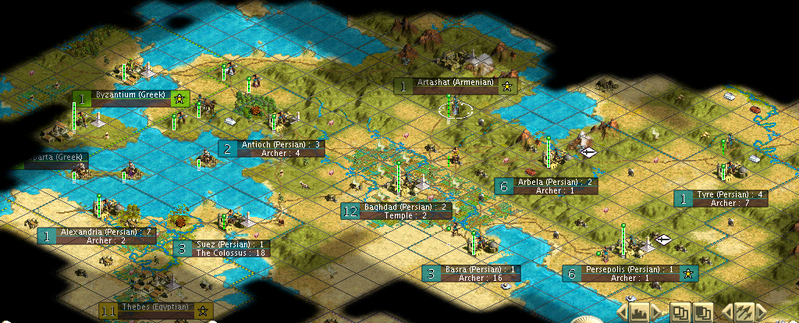
Yeah, I know we're fairly supersized. We haven't acquired copper and tin though yet, so no spearmen to hold such a vast realm together! That's what the war with Armenia is for. ;3
P.S. I should try to get more pictures next time...and make it more detailed... I wrote this when I was tired so...
See ya next time! ^__^
1) Sorry for basically ditching my story about the Roman Empire...guess it's dead. Hopefully this one will do better...
2) I modded this map:
a - Deserts, Mountains and Tundra cannot be used for cities. This is to try and reduce the strain of the city limit, as well as create 'natural' barriers, much like the Sahara and Himalayas did in true history.
b - Some civs have favored positions. For instance, Rome, Persia, Egypt, Carthage, China and Greece all start with a moderate level of infrastructure. The silk road of old also runs through the map, making it a profitable route in early times.
c - Some civs are entirely new and sport their own brand of units, and some units have been empowered. For instance, the Greek Hoplite will OWN anything that tries to fight it, Roman Legionaries are equally skilled in defense and offense, and the Persian Immortal will crush most defenders with ease. Greece starts off with a Hoplite unit to serve as a buffer state between Rome and Persia. The Arab Ansars can now become insanely powerful, while the Turks and Mongols share a nomadic horseman that can be a thorn in 'civilised' countries' sides.
Civilisations like Polynesia were quickly put together. They can cross the oceans and seas at an early year with their sink-proof ships. They start in Hawaii, and could develop into a vast overseas empire.
d - Depending on their historical significance, countries were given more settlers. The Persians, Romans, British and Russians, because of their very successful and long-lived empires, start with 3 settlers, 3 spearmen and 3 workers. Same goes for China.
e - On a minor note, in story terms: Every unit of health constitutes 100 men unless otherwise noted, and 1 unit of gold is worth 100,000 in story terms.
Now, enjoy the beginning of the Persian dominance!
Tanician Persia - 3000 BC - 2500 BC
------------------
An excerpt from the Chronicles of Persia by an author whose name has been forsaken in time...
"...The Persian Empire was not always so vast. Not covering every corner of the center of the world and the four directions beyond it. How we began is very simple.
The many faiths and townships that made up what is now the region of Persepolis were independant. They were fierce rivals with eachother, and many battles would occur intermittenly, decimating the region. That is at least until the great one, Cyrus II, was born. Upon reaching a sufficient age, he used statesmenship and war to unite the cities, centralise the government and then before the end of his rule conquered the many minor tribes, carving out a political entity which stretched across much of the Fertile Crescent...our role as a power was secured.
We were blessed not really by Cyrus, but by his true parents..not the mortal husks who fathered him, but the great deities of Heaven themselves..."
To this day, though the religion of Persia has indeed changed much, we still believe Cyrus had divinity. He had incredible longevity, incredible ability, and was able to bring peace to a warlike region for some time. He lived nearly 70 years, and in that timespan laid the foundations of our great empire...
If we go by scientific chronicles, the story is mostly the same, minus the 'gods.'
It all began about 6 millenia ago...in the stretch of desert and plains now called Persepolis.

We were surrounded by enemies from the start. A race called the Aryans inhabited the mountains and hills to the north. We tried our best not to aggravate them, but they nonethless would occassionally come in, killing men, dragging off women and crops...burning down homes. Causing havoc.
Cyrus changed all that!
Under the Great Leader Cyrus, we expanded our hold. By 2950 BC, near the end of his reign, we had expanded our borders, establishing colonies in Mesopotamia. This city was named Baghdad, un-Persian, but it was to keep the local tribes happy. Far flung as our possessions were, we nonetheless were far more secure from external threats.
Cyrus also set out to learn more about the vast world around us, dispelling the mystic theories that we were the only ones out there. Scouts were sent to the northwest, into what is called Asia Minor by the Greco-Romans.

It is said that Cyrus died in a very strange way. As he lie ill on his deathbed, he was heard rambling on. He woke up, and in what we believe was a seizure, started to spew these words: "A primitive people...a primitive land! The Mayans and Aztecs, gone!" Cyrus died afterwards...what caused this, we do not know. We believe it was prophecy, for we know now that there were an ancient people in the New World by those names...how Cyrus knew their names and the fact they mysteriously disappeared...we do not know. At the time, some radical philosophers assumed this meant there were great civilisations to match ours.
At first we laughed, but our scouts discovered something interested in northwest Asia Minor. Blocking the path was a row of men in green, carrying golden shields and with spears held out. Our scout was threatened, said an inch further would constitute war against 'Greece'. Apparently there WERE other peoples!
A little later, our new leader, Cyrus III, young as he was yet nonetheless intelligent, went back to the same location with his personal guard. After sitting down with the Greek Leader, Byzanteas, the tyrannical despot of Byzantium, we worked out agreements. We gave up 9,000,000 of our 10 million units of gold...for a very lucrative technology known as the alphabet, a way of writing down messages..we also had to give them pottery, which an impoverished village had taught Cyrus to make before he slaughtered them all.
That's right, slaughtered. Cyrus III was a b--tard, unlike his father. He was different from Cyrus...very nationalist and fascist. He was arrogant and cocky. 'Tis was the price of being rushed to the throne so quickly without study...
So Cyrus returned to Persia without much money...and was promptly slain by the mob when they got word of how he got the knowledge of Pottery. The reason? Not outrage, but law itself. Cyrus had lied, he had told the people the Greeks had ackowledged Persian dominance, giving him both technologies and demanding a minor fee. Taking a loss to show their submission.
Lying was forbidden in Persia, even on the leader's part. Not being anywhere near as righteous as his father, Cyrus III was executed. His guards stood aside, knowing it to be the truth that this man could not compare to his father.

Thank whatever deity you all worship Cyrus was removed within a year! Who knows what horrors he would have committed.
Cyrus III nonetheless played a vital role. He expanded our view of the world. Another village inhabited by 'Bactrians' was found. The chief had been kidnapped and the natives were told to reveal what they knew or he would die. When they did, they were all slain anyways. This map proved useful...the areas southwest of Byzantium, the 'Greece' spoken of...was revealed.
While we were being harassed by Aryans, our forces explored and found more of the region known as the Levant. We found a land bridge connected it to what is now Africa...but it was blocked all across by a horde known as the Hyksos. They were settled there and would not let us pass...unless we were willing to get impaled as we walked.
The Aryan Wars 2945 BC - 2530 BC
The Aryans were a vicious people. Knowing we were growing in power and would soon displace them, they launched an assault. At first their attacks were minor...then they focused on destroying what kept us together - Our roads. Roads around Persepolis and the new city of Arbela found themselves destroyed. The central city of Baghdad, settled in the center of our empire, in the perfect farmlands and between the two rivers, looked appealing as a capital...at this time, however, it was too dangerous to try a move in our seat of government.
Nonetheless, many of the common laborers were evacuated. Wartime production was put into place. Our unskilled people were being trained...they could not compare to the Royal Guard in qualities, but we needed to give it our all to drive out the savages.
We started to garner victories. The Greeks, seeing the chaos, fortified one of their men at the strategic point where Asia Minor and Asia connected, in the northeast corner of the Mediterranean...what is called Antioch now. They did not want any escaping hordes to flood into their lands...superior as their hoplites were.
We destroyed most of the Aryan tribes around the heartland by 2530. We had dispersed their bases and added their gold to our funds...sending it to the newly constructed city of Suez in the west to aid their construction project.
Nonetheless, the war on the Aryans claimed thousands of lives. Many of these were common peasants, thrust into battle to protect their country and it's existance.
The War on Barbarism
But we were fools. The Hyksos did not take kindly to us building the city and disbanding their encampments around it. They responded by attacking the city and slaying most of it's garrison and inhabitants. Most of our spoils were dragged off...but it mattered little to us. We still controlled one of the largest empires, and no savagaes would stop us!
Angered by this grave offense, the King made a declaration. Persians, when able and when capable, were to slaughter all barbarians they came across. He added 3 major tribes to this list: The Aryans in Persia, the Hyksos in Africa, and the Uzbeks in Asia to a limited extent. They must not be allowed to disrupt our growth!
Nonetheless, we worked on rebuilding Suez's economy. We sent more soldiers to the city, and were preparing to confront the Egyptians to the south...
But before that occurred, we completed our chariots. Few as they were, they were fast enough they could be useful. Seeing the weak, Greek city of Athens, we marched them forward. This city was occupying where we intended to construct Antioch!
Greco - Persian War 2350 BC - 2150
Persia did not have dreams of conquest in this war, amazingly. All we desired was to take that small city on the coastline, Antioch. Once burned to the ground, we could focus on building our own town there to secure Asia Minor. We also knew the Greeks would with time give the city it's own Hoplites...we could not allow such!
It was hard fight, they had many hundreds of warriors assembled...but we won. Athens was taken after 200 years and promptly destroyed. We declared our victory, and a celebration was held empire - wide!
We imposed a heavy fine and many penalties on the Greeks. They accepted defeat. We took every unit of gold they had, all 18,000,000 pieces of it. Persia suddenly became the richest country for miles. We also gained the land rights to build Antioch...truely glorious!
Persian Dominance
As we near the end of this chapter, let us do quick review. Persia, after destroying Athens, was able to proclaim dominance in all the extremities of the empire. We began to spy on our rivals, encountering the Indian tribe far to the east. We saw them occupying a land with a great monumental tower upon it...same as the one of Antioch. Feeling our obligation to rule it, we prepared another invasion...The incursion was successful thanks to minor fortifications. The Indians were decimated.
A peace treaty and a settlement later, Karachi was built at the mouth of the Indus. We now expanded a vast distance, to every corner of the main overland route between Asia and Europa. We also met the Egyptians, aweing them with our might, managing to learn their arts of meditation, known as Mysticism. We returned back to Suez, slaughtering more Hyksos as a demonstration to the Egyptians of our power.
While we were preparing to invade Armenia, we came across men dressed similar to them. Thinking we could ambush them, we found out they were in fact from a far off region known as the Benelux. The Benelux was a confederation of peoples in a far away land, strung together to protect themselves from these bands of people known as the 'Germans', 'Franks', and 'English'. We were intrigued, but sent them off. Complete with an emissary.
----
Well, that's it guys! I played a little bit over the 2000 BC limit...to 1830. XD Either way, here's my empire at the end of this session:

Yeah, I know we're fairly supersized. We haven't acquired copper and tin though yet, so no spearmen to hold such a vast realm together! That's what the war with Armenia is for. ;3
P.S. I should try to get more pictures next time...and make it more detailed... I wrote this when I was tired so...
See ya next time! ^__^

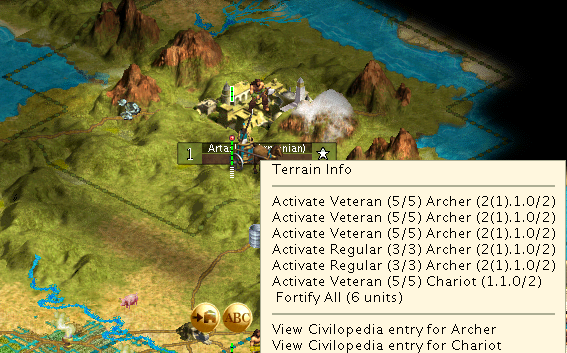
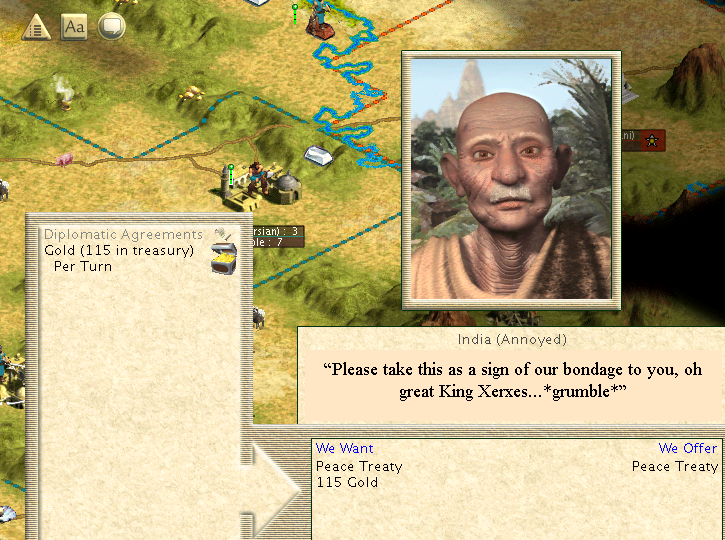
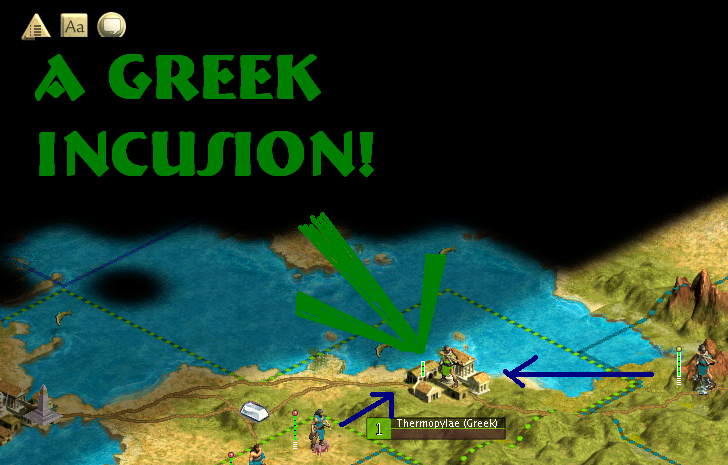
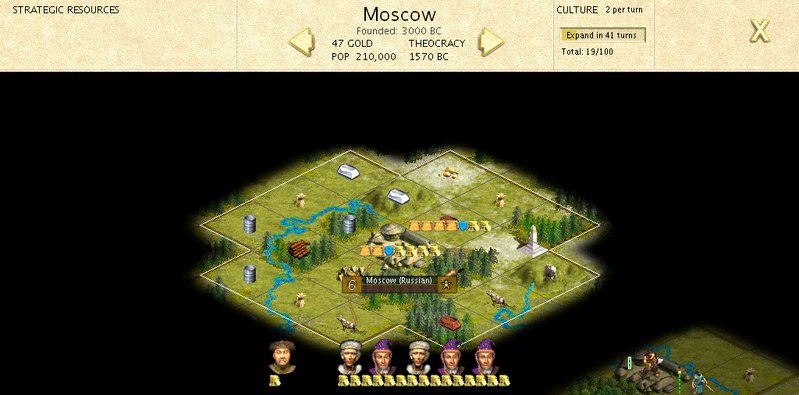
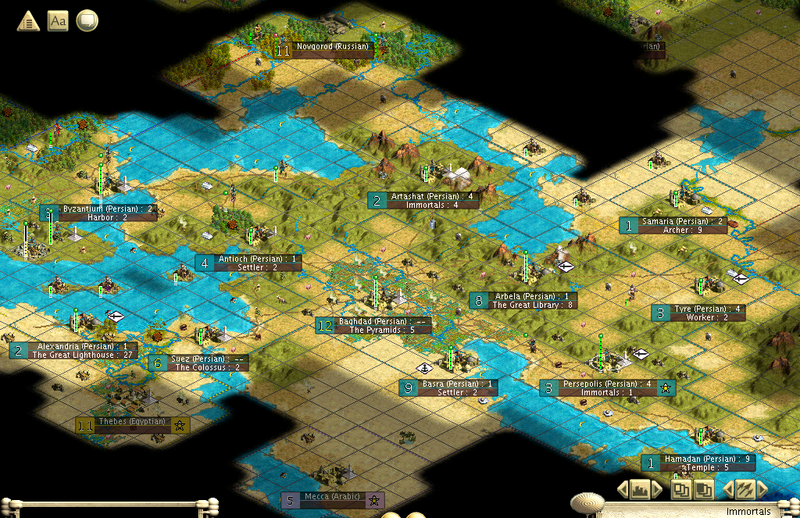
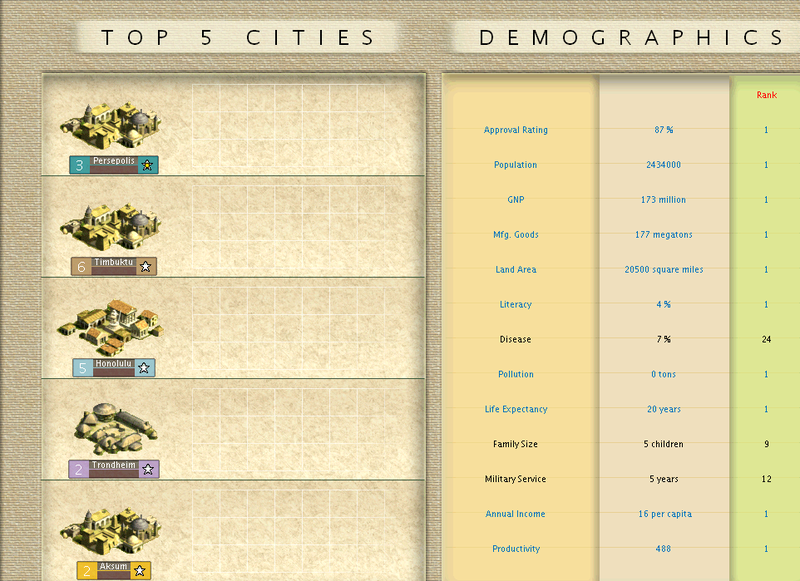
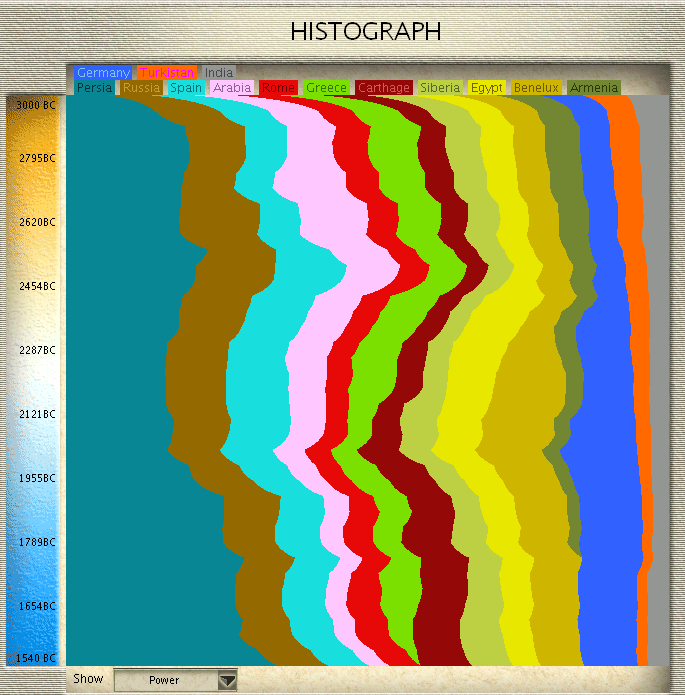
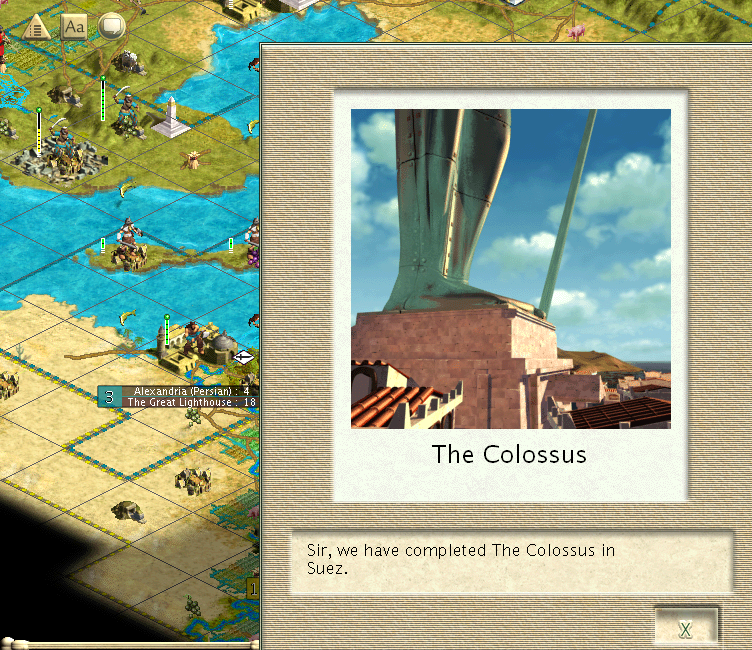
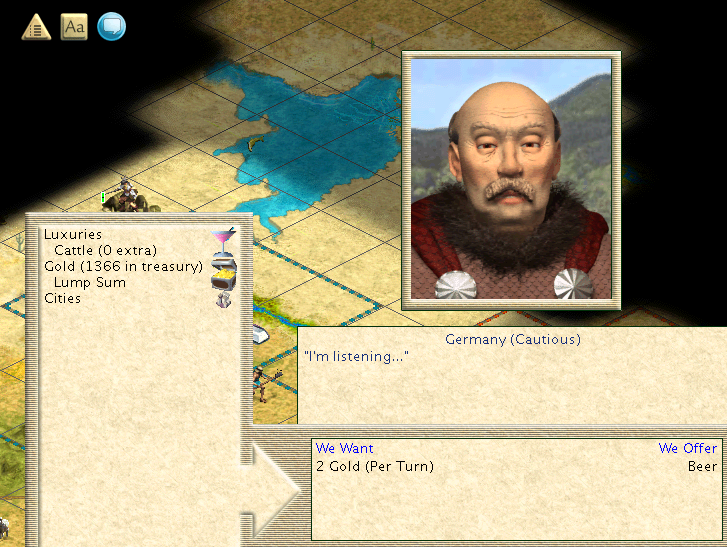
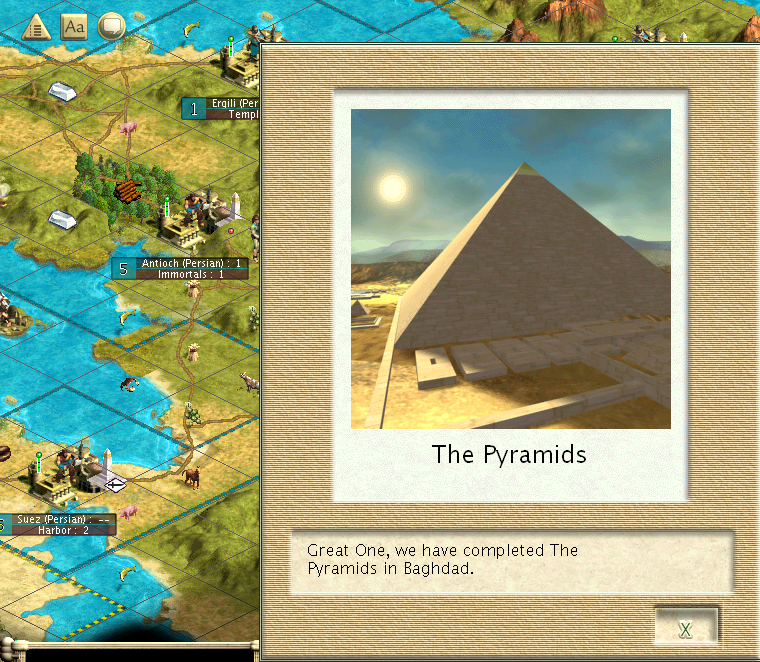
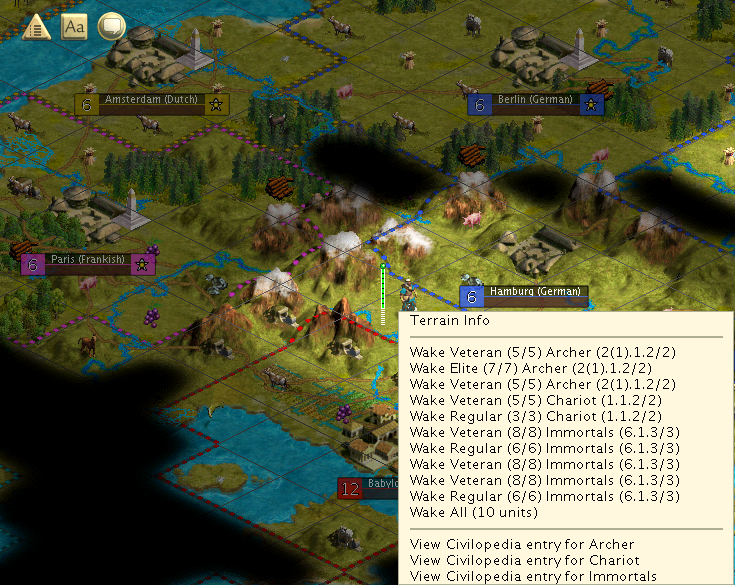
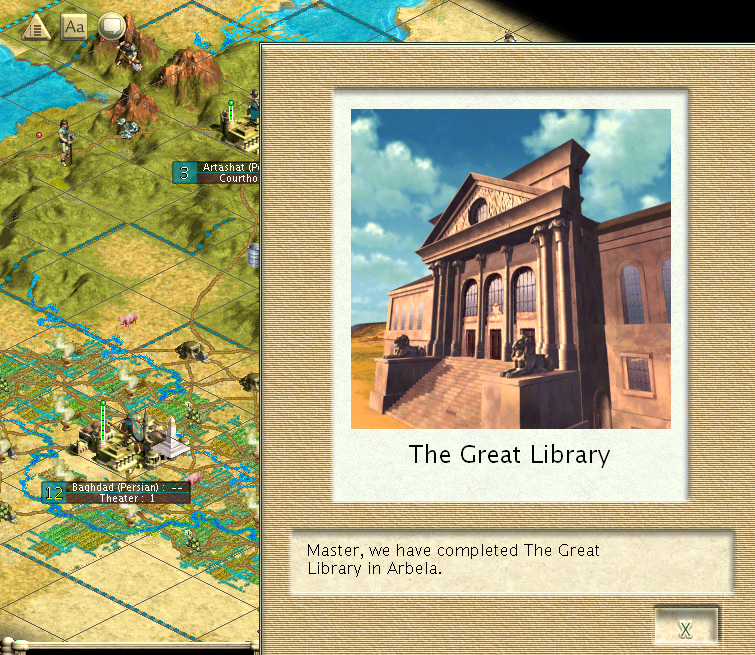
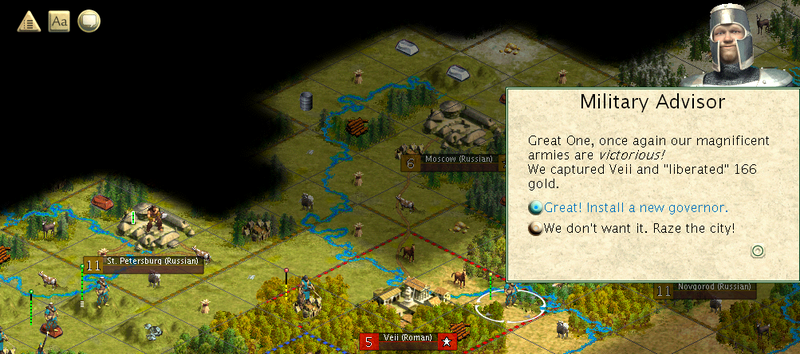

 I just somewhat modded the units, added a few extra resources, etc. but otherwise it was very easy. A word of advice though, if you ever make a similar map, make sure you make it so copper and tin don't run out like they did in this map. x__X
I just somewhat modded the units, added a few extra resources, etc. but otherwise it was very easy. A word of advice though, if you ever make a similar map, make sure you make it so copper and tin don't run out like they did in this map. x__X